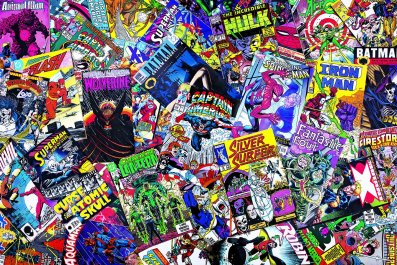Christian Scott aTunde Adjuah always hated the trumpet. Really hated it. But growing up in 1980s New Orleans, where music was one of the few ways a kid could get out of his neighborhood, the instrument he preferred was already taken. Adjuah is the nephew of renowned saxophonist Donald Harrison Jr., and "I knew that if I played the saxophone, I probably wasn't going on the road," he says. "My uncle still would have trained me at home. But if I played the trumpet, I was going to be onstage getting the actual lessons."
Related: A Long-lost Thelonious Monk Album Is Finally Released 60 Years Later
By 16, he was a bona fide prodigy, and in the more than two decades since, the 34-year-old has won awards, toured the world and released close to a dozen acclaimed albums, beginning with his self-titled debut in 2002. One thing never changed, though. "I hate the fucking sound of the trumpet, man. It's fucking terrible."
So Adjuah ditched it and invented something better. We're talking in the upstairs greenroom of the legendary Blue Note Jazz Club in New York's Greenwich Village, and he's explaining what he calls his "B-flat instruments," which look a bit like space-age weapons. Such innovation is a natural extension of Adjuah's unorthodox music. Along with fellow jazz musicians Robert Glasper and, more recently, Kamasi Washington, Adjuah has been at the forefront of a generation tearing down the boundaries between genres, with elements of rock, hip-hop and electronic music flowing into jazz recordings and vice versa. Adjuah has collaborated with Thom Yorke and Mos Def; Glasper and Washington worked with Kendrick Lamar on his Grammy-winning 2015 album To Pimp a Butterfly.
Adjuah's sounds are recognizable—a modification of traditional jazz, with familiar elements—but he welcomes myriad influences, from trap beats to samba rhythms to polka. "Jazz is the original fusion music," Adjuah says. "Bringing all of this in is the essence of it; the traditional tenets are to constantly search, to look for new terrain, new vernacular and new ways of communicating. But we were up against this notion that it had to be one way."
Adjuah is about to release the final installment of an ambitious and socially insightful expression of his jazz vernacular, what he calls his "Centennial Trilogy," three albums commemorating the 100-year anniversary of the first jazz recording: "Livery Staple Blues," from the Original Dixieland Jass Band. Adjuah and his band are at the Blue Note for a final night of sold-out shows in support of this installment, The Emancipation Procrastination, recorded in just six days but in the works since he was 14. When he was growing up, his musical elders would say, "'When you guys get to be adults, the century mark will be up,'" Adjuah says. "'What are you going to do? How are you going to create beauty out of this moment, how are you going to spark a musical dialogue that will last another century? Are you good enough? Are you valiant enough?' I began the work in that moment."
His experiences as a teenager in the Upper 9th Ward shaped his music further. "I've seen white people enduring food insecurity. I've seen black people enduring the same things. They view each other as their nemesis, even though they're the same people," he says. "As a social construct, race exists, but it doesn't, man. There's no Homo sapiens Africans."
In time, Adjuah began to find the term jazz "limiting," so he created a new name, "stretch music," for a sound free of artificial and arbitrary boundaries, where Kurt Cobain is as much of a blues musician as Muddy Waters. He says, "If I can blur or obliterate the spaces between genres, which are the cultural expressions of the [races] that we've carved up, then what am I saying about the people?"
Later that night, as he stood on the Blue Note stage, you could see evidence of Adjuah's hopeful philosophy on the faces of the beguiled and diverse crowd: Asian, white, black and everything in between. "I've never met anyone who doesn't like sounds," Adjuah said earlier. "There's nothing more powerful than the potential music has, to be able to heal people and to get people past that junction. I think we're going to do it."
The third and final installment of the Centennial Trilogy, The Emancipation Procrastination, is out October 20 on Adjuah's label, Stretch Music (via Ropeadope).
















